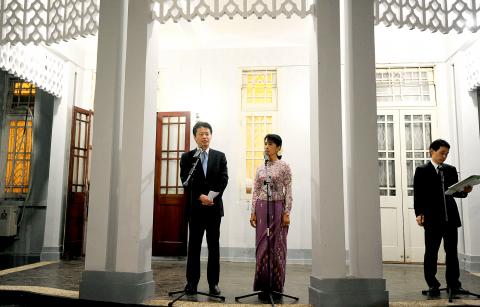Myanmar and its one-time biggest benefactor, Japan, agreed to talks on a bilateral investment treaty and took other steps toward better relations as Japanese Foreign Minister Kocihiro Gemba visited on Monday.
Gemba said afterward Japan wants to help Myanmar fight poverty that grips the country and was pleased they agreed to talks on an treaty to protect Japanese investments.
The first Japanese foreign minister to visit Myanmar in nine years, Gemba met Burmese President Thein Sein and other government officials in the capital, Naypyidaw, then later talked to pro-democracy advocate Aung San Suu Kyi in Yangon.

Photo: AFP
Aung San Suu Kyi stressed the importance of Japan’s aid reaching ethnic minority areas where it is most needed, according to Gemba. Aung San Suu Kyi said she also asked Japan to consider strengthening Myanmar’s democratic institutions.
Japan was Myanmar’s largest aid donor until it cut most funds in 2003 after pro-junta thugs attacked Aung San Suu Kyi’s motorcade on a political organizing trip in northwestern Myanmar. The military government then placed her under house arrest, which ended in November last year.
Japan has continued small amounts of humanitarian grassroots aid for the health and education sectors and has also maintained some trade ties with Myanmar since then. The aid was allotted without violating Western sanctions against Myanmar, and Japan did not impose sanctions on its own.
However, Gemba’s visit is considered a reopening of better ties between the countries with a long history. In his meeting with government officials, Japan also offered increased economic help for the education and agriculture sectors.
His visit follows several nations that have sent officials to Myanmar after its new, nominally civilian government made political reforms this year.
US Secretary of State Hillary Rodham Clinton and Thai Prime Minister Yingluck Shinawatra visited earlier this month.
Yingluck, after meeting with Thein Sein, became the first prime minister from the Southeast Asia region to meet Aung San Suu Kyi.
Last week, Aung San Suu Kyi formally registered her party for any upcoming elections, returning the Nobel laureate to the political arena and winning plaudits from her political rivals in Myanmar’s military-dominated parliament.

ELECTION DISTRACTION? When attention shifted away from the fight against the militants to politics, losses and setbacks in the battlefield increased, an analyst said Recent clashes in Somalia’s semi-autonomous Jubaland region are alarming experts, exposing cracks in the country’s federal system and creating an opening for militant group al-Shabaab to gain ground. Following years of conflict, Somalia is a loose federation of five semi-autonomous member states — Puntland, Jubaland, Galmudug, Hirshabelle and South West — that maintain often fractious relations with the central government in the capital, Mogadishu. However, ahead of elections next year, Somalia has sought to assert control over its member states, which security analysts said has created gaps for al-Shabaab infiltration. Last week, two Somalian soldiers were killed in clashes between pro-government forces and

Ten cheetah cubs held in captivity since birth and destined for international wildlife trade markets have been rescued in Somaliland, a breakaway region of Somalia. They were all in stable condition despite all of them having been undernourished and limping due to being tied in captivity for months, said Laurie Marker, founder of the Cheetah Conservation Fund, which is caring for the cubs. One eight-month-old cub was unable to walk after been tied up for six months, while a five-month-old was “very malnourished [a bag of bones], with sores all over her body and full of botfly maggots which are under the

BRUSHED OFF: An ambassador to Australia previously said that Beijing does not see a reason to apologize for its naval exercises and military maneuvers in international areas China set off alarm bells in New Zealand when it dispatched powerful warships on unprecedented missions in the South Pacific without explanation, military documents showed. Beijing has spent years expanding its reach in the southern Pacific Ocean, courting island nations with new hospitals, freshly paved roads and generous offers of climate aid. However, these diplomatic efforts have increasingly been accompanied by more overt displays of military power. Three Chinese warships sailed the Tasman Sea between Australia and New Zealand in February, the first time such a task group had been sighted in those waters. “We have never seen vessels with this capability

‘NO INTEGRITY’: The chief judge expressed concern over how the sentence would be perceived given that military detention is believed to be easier than civilian prison A military court yesterday sentenced a New Zealand soldier to two years’ detention for attempting to spy for a foreign power. The soldier, whose name has been suppressed, admitted to attempted espionage, accessing a computer system for a dishonest purpose and knowingly possessing an objectionable publication. He was ordered into military detention at Burnham Military Camp near Christchurch and would be dismissed from the New Zealand Defence Force at the end of his sentence. His admission and its acceptance by the court marked the first spying conviction in New Zealand’s history. The soldier would be paid at half his previous rate until his dismissal